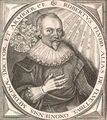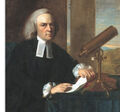Template:Selected anniversaries/December 19: Difference between revisions
No edit summary |
No edit summary |
||
| Line 4: | Line 4: | ||
File:John Winthrop.jpg|link=John Winthrop (scientist) (nonfiction)|1714: Mathematician, physicist, and astronomer [[John Winthrop (scientist) (nonfiction)|John Winthrop]] born. He will be one of the foremost men of science in America during the 18th century. | File:John Winthrop.jpg|link=John Winthrop (scientist) (nonfiction)|1714: Mathematician, physicist, and astronomer [[John Winthrop (scientist) (nonfiction)|John Winthrop]] born. He will be one of the foremost men of science in America during the 18th century. | ||
||1741 | ||1741: Vitus Bering born ... hydrographer and explorer. | ||
||1852 | ||1852: Albert Abraham Michelson born ... physicist, chemist, and academic, Nobel Prize laureate. | ||
||1875 | ||1875: Mileva Maric born ... physicist. | ||
||1875 | ||1875: Grace Marie Bareis born ... mathematician. | ||
||Balfour Stewart | ||1887: Balfour Stewart dies ... physicist. His studies in the field of radiant heat led to him receiving the Rumford Medal of the Royal Society in 1868. | ||
||1900 | ||1900: Margaret Brundage born ... illustrator, known for illustrating pulp magazine ''Weird Tales''. | ||
File:Rudolph Hell.gif|link=Rudolf Hell (nonfiction)|1901: Inventor and engineer [[Rudolf Hell (nonfiction)|Rudolf Hell]] born. He will invent the [[Hellschreiber (nonfiction)|Hellschreiber]] teleprinter system. | File:Rudolph Hell.gif|link=Rudolf Hell (nonfiction)|1901: Inventor and engineer [[Rudolf Hell (nonfiction)|Rudolf Hell]] born. He will invent the [[Hellschreiber (nonfiction)|Hellschreiber]] teleprinter system. | ||
||1903 | ||1903: George Davis Snell born ... geneticist and immunologist, Nobel Prize laureate. | ||
||1912 | ||1912: William Van Schaick, captain of the steamship General Slocum which caught fire and killed over one thousand people, is pardoned by U.S. President William Howard Taft after three-and-a-half-years in Sing Sing prison. | ||
||Ernst Stuhlinger | ||1913: Ernst Stuhlinger born ... atomic, electrical, and rocket scientist. After being brought to the United States as part of Operation Paperclip, he developed guidance systems with Wernher von Braun's team for the US Army, and later was a scientist with NASA. He was also instrumental in the development of the ion engine for long-endurance space flight, and a wide variety of scientific experiments. Pic. | ||
||Arthur Williams Wright | ||1915: Arthur Williams Wright dies ... physicist. His research, which ranged from electricity to astronomy, produced the first X-ray image and experimented with Röntgen rays. Pic. | ||
||Robert "Bob" Osserman | ||1926: Robert "Bob" Osserman born ... mathematician who worked in geometry. He is specially remembered for his work on the theory of minimal surfaces. Pic. | ||
|| | ||1932: Crispin St. John Alvah Nash-Williams ... mathematician. His research interest was in the field of discrete mathematics, especially graph theory. Pic: http://www-history.mcs.st-andrews.ac.uk/Biographies/Nash-Williams.html | ||
||1946 | ||1939: Dmitry Aleksandrovich Grave dies ... mathematician. | ||
||1946: Paul Langevin dies ... physicist and academic (b. 1872) | |||
File:Robert Andrews Millikan.jpg|link=Robert Andrews Millikan (nonfiction)|1953: Physicist [[Robert Andrews Millikan (nonfiction)|Robert Andrews Millikan]] dies. He won the Nobel Prize for Physics in 1923 for the measurement of the elementary electronic charge and for his work on the photoelectric effect. | File:Robert Andrews Millikan.jpg|link=Robert Andrews Millikan (nonfiction)|1953: Physicist [[Robert Andrews Millikan (nonfiction)|Robert Andrews Millikan]] dies. He won the Nobel Prize for Physics in 1923 for the measurement of the elementary electronic charge and for his work on the photoelectric effect. | ||
| Line 36: | Line 38: | ||
File:John Bodkin Adams 1940s.jpg|link=John Bodkin Adams (nonfiction)|1956: Physician, confidence trickster, and suspected serial killer [[John Bodkin Adams (nonfiction)|John Bodkin Adams]] is arrested in connection with the suspicious deaths of more than 160 patients. Eventually he is convicted only of minor charges. | File:John Bodkin Adams 1940s.jpg|link=John Bodkin Adams (nonfiction)|1956: Physician, confidence trickster, and suspected serial killer [[John Bodkin Adams (nonfiction)|John Bodkin Adams]] is arrested in connection with the suspicious deaths of more than 160 patients. Eventually he is convicted only of minor charges. | ||
| | ||1972: Apollo program: The last manned lunar flight, Apollo 17, crewed by Eugene Cernan, Ronald Evans, and Harrison Schmitt, returns to Earth. | ||
|| | ||1982: Frederick Emmons Terman dies ... professor and academic administrator. He is widely credited (together with William Shockley) as being the father of Silicon Valley. Pic. | ||
|| | ||1986: Mikhail Gorbachev, leader of the Soviet Union, releases Andrei Sakharov and his wife from exile in Gorky. | ||
|| | ||1993: Hans Rohrbach dies ... mathematician. He worked both as an algebraist and a number theorist and later worked as cryptanalyst at Pers Z S, the German Foreign Office cipher bureau, during World War II. Pic. | ||
|| | ||1998: Mel Fisher dies ... treasure hunter (b. 1922) | ||
|| | ||1999: Dennis William Siahou Sciama (d. 18/19 December 1999) was a British physicist who, through his own work and that of his students, played a major role in developing British physics after the Second World War. He is considered one of the fathers of modern cosmology. | ||
|| | ||2004: Herbert C. Brown dies ... chemist and academic, Nobel Prize laureate. | ||
| | ||2005: Vincent Gigante dies ... mobster. | ||
||2013 | ||2013: Spacecraft ''Gaia'' is launched by European Space Agency. | ||
</gallery> | </gallery> | ||
Revision as of 14:02, 22 August 2018
1601: Mathematician Robert Fludd uses Gnomon algorithm to fight crimes against mathematical constants.
1714: Mathematician, physicist, and astronomer John Winthrop born. He will be one of the foremost men of science in America during the 18th century.
- Rudolph Hell.gif
1901: Inventor and engineer Rudolf Hell born. He will invent the Hellschreiber teleprinter system.
1953: Physicist Robert Andrews Millikan dies. He won the Nobel Prize for Physics in 1923 for the measurement of the elementary electronic charge and for his work on the photoelectric effect.
1956: Physician, confidence trickster, and suspected serial killer John Bodkin Adams is arrested in connection with the suspicious deaths of more than 160 patients. Eventually he is convicted only of minor charges.



